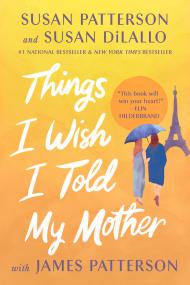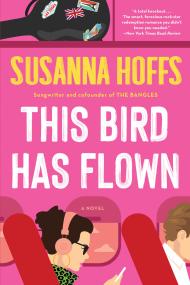We have updated our Privacy Policy Please take a moment to review it. By continuing to use this site, you agree to the terms of our updated Privacy Policy.
Description
At the school gates, Faiza fits in. It took a few years, but now the snobbish white mothers who mistook her for the nanny treat her as one of their own. She's learned to crack their subtle codes, speak their language of fashion and vacations and haircuts. You'd never guess, seeing her at the trendy kids' parties and the leisurely coffee mornings, that her childhood was spent being bullied and being embarrassed of her poor Pakistani immigrant parents.
When her husband Tom loses his job in finance, he stays calm. Something will come along, and in the meantime, they can live off their savings. But Faiza starts to unravel. Creating the perfect life and raising the perfect family comes at a cost – and the money Tom put aside has gone. Faiza will have to tell him she spent it all.
Unless she doesn't…
It only takes a second to lie to Tom. Now Faiza has mere weeks to find $100,000. If anyone can do it, Faiza can. She's had to fight for what she has, and she'll fight to keep it. But as the clock ticks down and Faiza desperately tries to put things right, she has to ask herself: how much more should she sacrifice to live someone else's idea of the dream life?
What's Inside
One
Five months earlier—April
The last thing you need to hear when you’re waiting to get Botox at a Harley Street clinic is that your husband may be about to lose his job.
I was at my first Botox party, although it felt more like a field trip for the Year r2 mothers. I’d started questioning the wisdom in coming as soon as I’d stepped into the clinic, but then Lizzie’s excitement began to rub off on me. I noticed that I was the only brown face there, but I was used to that, especially with this group. I tried to get into the spirit of things. I reminded myself that this wasn’t just about the Botox, but also hanging out with my friends. I didn’t want to be the odd one out. We flicked through the menu of face “enhancements,” laughing at options such as “Temptress,” “Diva” and“ Supermodel.” I was joking that there should be one called “Normal,” when Tom called my mobile.
“We just got an email from the CEO. ‘Due to the current economic climate, the Bank is restructuring with immediate effect.’ They’re laying off half the London team. Bob’s calling us into his office one by one. The HR director’s in there too.”
Shit.
I got up to walk to the far end of the waiting room. Lizzie stood in my way. She was smiling.
“Welcome to the club, Faiza! Here’s to your first time!”
She raised a glass of cold-pressed kale juice toward me, as did Anna, Cora and Bella, who all stood behind her. I smiled automatically and gave them a thumbs-up. On the phone, Tom was still talking. He said three people from Syndications had just been escorted away by security to clear their desks. I mouthed a silent “Sorry” to Lizzie, pointing to the phone, and hurried to the window, away from the others.
“How can they do this? Are you all right, darling?” I said. “I’m fine, don’t worry.” He spoke in his office voice. “I’m sure I’ll be OK. I’ve met all my targets this year and I’m about to close that deal in São Paulo.” He paused. “I won’t let them fire any of my team. They’re all good kids. They’ve worked hard.”
He kept on talking, upbeat, faster, listing the reasons why he would keep his job: he said more in those few minutes than he normally would in a week. I hated to think of him all alone in his office, high above the Royal Exchange, and wanted to rush to him. They should allow family members to be present if they’re about to make you redundant, like they do for other bad news, like telling you that you might have some terrible disease.
Goosebumps flared a path down my arms. I knew I shouldn’t have come. We were supposed to be on a budget. I’d tried to stay away, I really had. I’d made some excuse the last time Lizzie had asked me along. But I couldn’t stand my crumpled forehead anymore, when I compared it to the smooth ones topping my friends’ faces. It seemed almost rude to cart that forehead into people’s houses. Like turning up without brushing your teeth. Still, now I felt like a criminal.
“Sweetheart, I’m sure you’ll be—” I said.
“They’re calling me. I have to go.”
The line went dead.
As I walked back into the party, Anna held out a tray of miniature brownies.
“Have one of these, Faiza. Do you fancy a makeup lesson? There’s a makeup artist doing demos.”
I shook my head.
“I’m sorry, but I need to go home.”
“Why? Is everything OK? It’s not one of your parents, is it?”
“No, no, they’re fine, thank you. It’s just a plumbing emergency, but I need to go.” The words tripped easily from my lips.
I scooped up my bag. My phone clattered to the floor. Before I left, I needed to get my money back. I hurried to the “treatment concierge” desk in the corner.
“I’m so sorry but I can’t have the treatments today. My builders have hit a pipe and my kitchen’s flooded. They’ve had to call the Fire Brigade.”
This had, in fact, happened last year. I could have said one of the children or Baba was ill, but that would have been tempting fate.
“Of course!” said the receptionist. “I’ll cross you off the list. Good luck!”
She looked back down at the papers on her desk. I stood, not sure what to do. I held out my debit card to the top of her blonde bob.
“Excuse me...for the refund?”
She looked up and frown-smiled at me.
“I’m so sorry but we charge a 1oo percent cancelation fee for less than twenty-four hours’ notice. It’s clinic policy.”
I opened my mouth to argue, but nothing came out. The packed waiting room was silent behind me. I looked down. My face felt hot.
“Why don’t you just have the treatment?” I didn’t want the kindness in her voice. “We can have you out of here in twenty minutes.”
“You can go first, Faiza, before the rest of us,” said Lizzie.
The nurse was standing in the doorway. She checked her clipboard.
“We can take you in now, Faiza. Follow me.”
I hovered between the desk and the door. Nothing had happened yet, had it? There was no need to assume the worst. I refused to think like Ami. By now, she’d have fast- forwarded the scenario to a sorry end: Tom getting sacked, then having a heart attack, the house being repossessed and all of us moving to a concrete estate at the tattered edges of London, the children becoming knife-wielding gang members! She’d be on her prayer mat, begging God to have mercy on her daughter and grandchildren, and to save her son-in-law’s life.
I followed the nurse down a corridor, hugging my coat to my chest. I heard myself replying to her comments about the tube strike and the weather. I checked my mobile to make sure the ringer was still turned on. They wouldn’t sack Tom. He’d been nervous when he’d first joined the bank, but as the months passed, I’d heard snippets about “million-dollar wind farms” and “solar projects in Brazil,” and he began to sleep properly again as the deals started to come in.
I lay down in the treatment chair. My foot started to shake.
“Nervous?” said the nurse. “Let me put some numbing cream on for you.”
She smoothed icy gel onto my forehead. I shivered, wishing that it would seep into my mind as well. I imagined Tom walking into the room to hear his fate, his midlife heart hammering, trying to appear composed in the open-plan fishbowl that magnified every emotion for those watching the show.
“This should start working soon.”
The nurse smiled and took off her gloves. I dabbed the tears in the inner corners of my eyes with my index finger, pretending to dislodge a speck of dirt or an eyelash. I wasn’t there just to indulge myself. The Botox injection was supposed to vaccinate my relationship against a marital superbug: the usual viruses that weaken long marriages— time, money, juggling three children, four parents, two cultures. I didn’t want to add another item to the list by “letting myself go” and have him go off with someone else. It had happened to our friends Amanda and Johnathan. As Lizzie said, “Men become silver foxes, women just become silver.”
The highest divorce rates were for people in their forties. I hadn’t dared to google the stats for a mixed-race couple. I’d always had to work hard at looking good, and the older I got, the harder I had to work at it. Not having Botox would have been a false economy in the long run.
Dr. Curtis entered, his age-neutral face and uniform tan highlighting his transatlantic credentials. My phone rang.
“I’m so sorry, Doctor, I have to take this.” I escaped into the corridor.
“I’ve been let go. They’ve had to restructure due to losses across EMEA. They can only keep one Team Head. They’re keeping Matt.”
He repeated the HR spiel they must have rolled out for him.
“Darling, I’m so sorry.”
I wanted to wrap my arms around him. They had no right to do this to Tom. He hadn’t done anything wrong. I began to pace the corridor, pressing the phone hard into my ear.
“Look, it’s going to be OK,” I said.
But thoughts exploded like grenades in my head, despite my verbal bravado. How would Tom cope with losing his job? How long would it take until he found a new one? Sofia was in the middle of her A levels. We couldn’t pull her out of Brookwood High. Ahmed had finally settled down at the new school. I couldn’t move him again. Not after last year.
“You’ll find something else,” I said.
“I’m not so sure. The market is dead.”
“What kind of package are they giving you?”
It was important to know what kind of cushion we had.
“Nothing, just one month’s salary.”
“But that’s impossible! Don’t they have to give you at least three months’ pay? What about your bonus? What about BUPA?”
Ahmed’s treatment was being paid for by the insurance. I sank down on a stool in the corridor and leaned back against the wall.
“One month is all that I get. That’s the contract I signed, remember. No bonus either. They say the bank hasn’t made enough profit.”
“But we have some savings, right? We should be OK?”
He looked after all of that.
“I’ve been using the savings to pay the school fees. That account’s almost empty. I was going to put my bonus in there next month.”
We’d been planning how to use this suddenly non-existent bonus for months.
“Don’t worry, Faiza,” he said, listening to my silence. “We still have the emergency fund. That should keep us going until I find something else.”
The emergency fund.
The room spun. I clutched the side of the stool, afraid I was going to fall. I leaned forward and rested my elbows on my knees, gripping the phone tighter. I focused my eyes on the blue and yellow diamond pattern on the carpet and counted the tiny blue squares between my cream suede ankle boots.
“Yes, of course,” I managed to say.
I wasn’t sure about the balance in that account. I’d been dipping into it for months, maybe more. Money for birthday parties, school trips, Ubers, Deliveroo, presents, furniture, dinner parties, concert tickets, clothes, spending money, Ami and Baba’s cleaner, Lingo Bear, the Botox party...The statements were lying unopened in my“documents folder”— an old LK Bennett shoe bag—at the back of my cupboard. It was easier not to see what I’d spent. I’d planned to put the money back by getting a job one day when Alex was older. I never imagined we’d need that money so soon, if at all. I couldn’t have spent that much, though. I was probably worrying unnecessarily.
“Are you OK?” I asked.
That was what really mattered. He didn’t deserve getting fired in a five-minute conversation, by a boss ten years younger than him. He should have been safe by now. That was the plan he’d slogged and sacrificed toward for twenty-five years.
“They’re taking away my phone so I won’t be able to call you till I get home. Where are you?”
“Peter Jones.” It popped out easily. I couldn’t tell him where I really was. “I’ll head home too.”
The nurse waved at me, to hurry me along.
“I love you,” I said, but Tom had gone.
The nurse ushered me back to the doctor. As the needle sank into my forehead, I wondered what Tom would think, if he saw me. A tear slipped out from the corner of my eye. The doctor apologized for the pain.
I ran out of the clinic and zigzagged my way through the snail-slow crowds on Oxford Street. A cyclist just missed me as I darted across the road, his “Stupid bitch!” still ringing in my ears as I ran down the escalators and jumped through the tube doors just as they were beeping shut.
At Waterloo, I caught the train to Wimbledon. I leaned my head against the window. Everything looked the same as it had that morning: the London Eye peeking out above the station wall against a matt gray sky, the usual people sitting around me, reading the Metro as if nothing was wrong. I wanted to text Tom to check if he was all right, but there was no way to contact him. I’d been trying to do a mental tally of how much I might have spent, but I had no idea. After avoiding the statements for months, I couldn’t wait a second more to check them. I had to get home before Tom.
Two
He’d beaten me to it.
I found him at the dining table under the Murano chandelier. He was hunched over the laptop with his back to me, scrolling through the E-Financial Careers website. His blue suit jacket lay discarded on a dining chair, the sleeves slumped on the floor like a dead body, his yellow silk tie scrunched up into a ball. He didn’t stand up or turn when he heard me come in. I put my arms around him from behind and leaned forward, pressing my cheek into his from the side, skin to skin, rubbing against a hint of stubble. I slid my hands down his forearms, until they came to rest over his.
“This looks promising,” I said.
There was a long list of jobs on the screen.
“I’ve applied for a couple already. I’m going to call up John and Tig and the old gang. I got David his role at Nomura, I’m sure he’ll help.”
I bent down and kissed the sliver of neck between his collar and hair, forgetting that I was supposed to keep my head upright after the Botox. His shoulders slumped. He turned around to face me and pulled me on to his lap. There were blue shadows under his eyes.
“Stefano doesn’t know how to tell his wife what’s happened. She’s just had a baby and they bought a new house a few months ago.”
“Poor guy,” I sighed, and kissed his forehead.
He stood up and stretched his arms above his head, flexing his shoulders. He tipped my chin up, then moved his hand to cup my cheek. I leaned into it. I could always tell how he was feeling from the temperature of his skin, or the color of his eyes. I was relieved to see that his eyes were a calm light blue. He looked at me and smiled.
“I don’t want you to go into one of your worrying overdrives, OK? We’re going to be fine.”
“What was all that ‘dead market’ doom and gloom?”
“That was just the shock talking. I’ll look after you. I always have, haven’t I? I’ve already fixed a meeting with a headhunter for tomorrow.”
He put his arms around me and I let myself slump against him. The beat of his heart seemed to confirm his optimism. My breaths started to come more easily again and in time with his. Even though he was so much taller than my five- foot three frame, and his body was still hard with muscle memory while mine was slim but soft, we slotted together perfectly. Whenever I imagined worst-case scenarios, like tsunamis, or nuclear war, or if I was dying of cancer or even old age, I knew that so long as Tom was holding me, it wouldn’t be as bad. His arms tightened.
“It might take a while to get another job, that’s all. But we have enough for next month’s bills, and then we can use the emergency fund.”
I froze. I struggled to keep my muscles limp and my breathing steady. I counted to a hundred and waited until I could extricate myself without arousing his suspicion. As soon as he was back at the computer, I went to our bedroom.
I shut the door and tapped the front of my ceiling-high wardrobe. It sprang open and I knelt down, removed several cardboard shoeboxes from the bottom section, then thrust my hand to the back of the cupboard. I had to lie almost flat on my stomach, on the cool parquet, to reach in. My fingers had just found the edge of the cotton shoe bag with the statements when I heard Tom calling me.
“It’s your mother on the phone.”
I’d forgotten about Ami and Baba.
“Just a sec!” I shouted.
I pushed everything back, stood up and ran downstairs. I was supposed to take Ami and Baba to Tooting to buy a freezer-full of halal meat and a cash-and-carry-sized bag of rice. We could have bought it all at the local supermarket in half the time, but for twice the price. That was both illogical and unacceptable to them.
“I have a bit of a cold coming on, Ami, so I came home early,” said Tom.
So that was how he wanted to play it. I nodded to show him that I understood, as he handed me the phone.
“Salaam alaikum, Beti. I’ve been so worried. I thought you’d had an accident. I didn’t want to call your mobile in case you were driving,” said Ami.
“Wa-Alaikum salaam, Ami, I’m so sorry, I should have called. Tom came home and I completely forgot.”
I thought about my parents waiting for me on the TV room sofa, their matching navy raincoats on in advance and Baba’s walking stick standing to attention in his hand. I didn’t know how long they must have stayed like that.
“I needed to collect my warfarin as well. You know I can get a blood clot if I miss a dose. But I don’t want you to leave Tom if he’s sick. Does he have a temperature? Make him honey and lemon with black peppercorns. Take some chicken wings and make some soup as well. Put lots of ginger and garlic in it. Do you want me to make it?”
“Thanks, Ami, but Tom’s fine. It’s just a cold. I’ll swing by the chemist on my way to get the boys. I’ll drop off the warfarin before your nine o’clock dose.”
I could shoehorn in the chemist if I left straightaway, but then I wouldn’t have time to check the papers. I had no choice; the statements would have to wait.
After dinner I made blueberry pancakes for dessert, a Saunders’ family tradition for birthday breakfasts and Sunday brunch. We ate in front of the TV, watching an episode of Friends. Tom and I sat on the sofa, our hips and knees stuck together. Ahmed, who at twelve was still amenable to physical contact, sat near me, his football- scabbed knee poking out of his rugby shorts and thrown across my leg. Alex, six, with his baby blond head bent in concentration, transported small pieces of pancake on wooden Thomas trains on the dark oak floor, changing his voice for each different engine. Sofia, excited about her school trip to Barcelona, had been persuaded to leave her room. She sat curled up in a cavernous, sky-blue armchair, at enough of a distance to disassociate herself from us, her open laptop a further shield.
The pancake stuck in my throat. I struggled to swallow each mouthful. I waited for a chance to get away to check the statements.
“Mum!” Sofia was waving her phone at me. “Why are we having pancakes today?”
I felt Tom’s body tense.
“Are you getting divorced? Is this to help us feel good before you tell us?”
“Have we won the lottery?” asked Ahmed, jumping up to sit on his knees on the sofa.
Sofia’s brown eyes, with expertly flicked wings of black eyeliner, narrowed at me as she waited for an answer. She was biting the tip of her thumb, which was half in her mouth. Her dark brown hair, an exact color mix of Tom’s light brown and my black, fell in waves to her waist. She’d recently started wearing red lipstick, which made her look like a young Sophia Loren but reminded me of a day when she was three; she had sneaked into my room to decorate her face, the walls, the windows, and even my computer with one of my lipsticks. Ahmed leaned forward, caught up in the moment and nothing else. His blue eyes shone, amused at his own joke. He looked just like Tom, only with darker skin and hair. I’d waited so long to see him like this again, laughing and carefree. I hoped that this was here to stay.
“Goodness, what imaginations! Nope. Happily, we are not getting divorced and, sadly, we have not won the lottery! We’re celebrating because Dad’s got a new project. He’ll be working from home for a few weeks so we get to see more of him. Isn’t that great?”
Sofia and Ahmed looked suitably disgusted as I laid my head on Tom’s shoulder. I laced my fingers through his and he held my hand back tight. It anchored me. It always had, since that first time we’d held hands, on a platform at Piccadilly Circus tube station, twenty-one years ago. He’d held it through every illness, every worry, every stressful day. He’d never let me down.
“Emergency! Emergency!”Alex frowned at an overturned train and slapped his forehead with a small hand.
Tom went down to the floor, folding his six-foot two frame inside the train track. He fixed a piece that had come undone. Alex gave his father a high five, then pushed some pancake from the floor into Tom’s mouth as a reward. Tom ate it with a grin, shaking his head as he caught my eye.
I grabbed my car keys, yawning. “I’d better drop off the medicines.”
“I’ll drive you,” said Tom.
In the car, he was silent. I turned toward him.
“You OK?”
No reply. His eyebrows frowned, the way they did when he was worried. I longed to smooth them back, and kiss his jaw until it relaxed.
“Look at the bright side—at least now you know I’m not with you for your money.”
I squeezed his thigh and grinned, but his expression didn’t change.
“There’s no doubt about that. I haven’t exactly brought in the millions, have I? You married the wrong sort of banker,” he said.
His mood had slumped as we’d driven away from the house.
“Well, A, I didn’t marry you because you’re a banker, and B, you’ve brought in plenty, thank you.”
I took his hand.
“You’ve just had some bad luck, that’s all. Lots of people are in the same boat. The ‘poor me’ act isn’t going to work. You’re not after some redundancy sympathy sex, are you, sir?”
“Worth a try.” A half-smile on his face.
I let myself relax against the headrest.
“We need to cut right back now, Faiza. I never thought you’d stick to our budget, but you’ve been great. We need to see where else we can economize.”
The credit card usage showed exemplary restraint on my part because I’d been paying for the extras from the other account. He was right, though. This was a crisis. I would stop.
“Yes, darling, absolutely.”
“Can you please give me the emergency account statements when we get home? I want to transfer that money to the current account so all the direct debits are covered. We should have enough savings for six months, maybe even eight.”
Did we? I had no idea.
“OK.”
“I made a spreadsheet for that account a while back. It will have the exact balance. I’ll check it when I get home. Then I’ll draw up a monthly budget to see how far we can stretch it.”
The emergency fund was the only account that I “looked after.” A couple of years earlier, Tom had moved the money to a new account with a better interest rate. He was in South Africa when the paperwork came and he asked me to file it away. After that he got busy at Apex and, as we weren’t using that account, he never needed to see the statements. It had fallen off his radar and into my lap.
I turned on the radio so that U2 filled up the space left by my silence. I knew that the balance would not be what he had on his spreadsheet. I also knew that I could never let him see the statements and find out that I’d been using our savings.
Once we got home, I locked the bedroom door and retrieved the LK Bennett shoe bag from the back of my cupboard. I undid the knots on the nylon drawstring, my nail snagging as I struggled. Most of the money was still there, I was sure it was. I peeked inside the bag, full of statements, unopened and unread. I pulled out an envelope at random, ripping it open. Too scared to look at the statement directly, I squinted at it through screwed-up eyes, holding it away from me at arm’s length. I opened my eyes slowly. I needn’t have worried: the balance from March, around two years earlier, was quite healthy.
Relieved, I tipped a flurry of white envelopes on to the floor and started to open them one by one, looking for the latest statement to see how much we had in the account now. After a few attempts, I found it. My eyes darted to the balance, locking on to the figure. I kept staring at it, until the numbers swam and became jumbled up. I held my breath. At first, I thought it must be a mistake, that I was reading the statements incorrectly. I ran my nail across the line, following the string of numbers with my fingertip. However many times I checked it though, the figure remained the same. There was nothing left. I had spent almost seventy- five thousand pounds.
I stuffed the ripped envelopes and the roughly folded statements back into the bag. My arms felt like lead. I was breathing too fast, but I couldn’t stop. I grabbed some Sellotape and wrapped it around the bag several times over, so the fabric was almost completely covered with tape and it was impossible for anyone to look inside. I hid it back in the cupboard then stayed on the floor, hugging my knees to my chest and rocking myself. My mind was a blank. I wanted to run—and keep on running. I pulled myself up, holding on to the bed. I went downstairs slowly, leaning on the banister.
I watched Tom from the living-room door as he sat on the sofa, watching Columbo in a pool of lamplight. He looked up and patted the seat next to him.
“We haven’t seen this one for ages. Come.”
He shifted and put his arm around me, making space on the footstool so that I could put my feet up next to his. I put my arm across his stomach and pressed myself into his side. I stared at the colors and shapes on the screen, not hearing anything.
We checked in on the children before we went to bed, for a change, together. The boys were asleep and Sofia was finishing off an essay in bed. I put away phones and books and hung-up sweatshirts and school ties, dropping a kiss on Sofia’s head, despite her “Go away, Mum!” All the time, my mind was screaming, “What have I done?” I watched the boys as they snuggled in soft, heavy duvets, sleeping toward the future we had promised them. The future I had taken away.
As I brushed my teeth, Tom came up behind me. He grinned and put his arms around me. I covered his hands with mine. They had not changed at all over the years and I stroked the golden hairs on the back.
“Screw the job, at least we still have each other,” he said.
I looked at us in the mirror and smiled.
“That’s all we need.”
I glanced down, hiding behind my individually attached lash extensions, so he couldn’t see the look in my eyes.
Tom fell asleep almost immediately. I tried to calm myself. He was confident, even though his default setting was caution, that he would find something soon. After all, he’d managed to get an interview within twenty-four hours of leaving Apex. With the redundancy money, and some holiday pay, we had enough in the current account to last us six weeks. I curled my hands into fists and squeezed my eyes shut. Tom would have a job before we needed the emergency fund money. I was sure he would.
Praise
—New York Times and Sunday Times Bestseller and Reece’s Bookclub pick February 2021 Sarah Pearse, author of The Sanatorium
—Sophie Kinsella, New York Times bestselling author of I Owe You One













